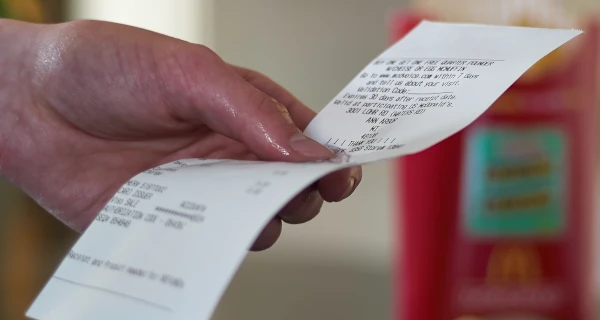Picture this: You’re at the grocery store, stocking up on your weekly essentials, and you proceed to the checkout. Upon paying, the cashier hands you a seemingly harmless receipt. But little do you know that you’ve just become exposed to a toxic substance.
This lurking menace is BPA, or bisphenol A, a chemical used to make certain plastics and resins. Among the items that commonly contain this toxin are cash register receipts and canned food containers.
What is BPA, and why should you care?
BPA has been a hot topic in recent years due to its potential health risks. The chemical can mimic hormones such as estrogen and has been shown to interfere with the body’s normal hormonal functions. With various scientific studies now pointing to its adverse health effects, it’s essential to be aware of the products in which BPA may be lurking.
Why receipts are riskier than you think
Many people handle cash register receipts every day without giving it a second thought. However, research by the University of Illinois found that the BPA in these seemingly innocent slips of paper can be absorbed by our skin and enter our bloodstream.
Moreover, if a mother is exposed to this toxin while pregnant, it can increase the risk of her male child developing prostate cancer later in life. This issue has become even more pressing, considering the high levels of BPA detected in urine samples, even among people who have actively tried to avoid using BPA-containing products for an extended period.
The ugly truth about canned foods
Cash register receipts aren’t the only items that put you at risk of BPA exposure. Food and drink cans are usually lined with a BPA-containing resin, which can leach into the products within. This leaching is amplified when the cans are subjected to high temperatures or acidic conditions.
While there is a divide in scientific communities on just how severe the risks of BPA exposure through canned food are, it’s hard to deny that even the tiniest amount of the toxin in our bodies is not ideal.
Safer alternatives and reducing exposure
While it may appear difficult to maintain a BPA-free environment in our day-to-day lives, there are a few steps you can take to protect yourself and your family from its harmful effects:
- Opt for BPA-free products: Many companies are now switching to healthier alternatives and labeling their products as “BPA-free.” Be sure to inspect the labels when shopping for plastic containers, water bottles, and even canned foods.
- Handle with care: Be mindful when handling receipts, and wash your hands after touching them. If possible, decline paper receipts altogether and opt for digital receipts instead.
- Use fresh and frozen foods: Consuming fresh or frozen vegetables and fruits reduces your exposure to BPA, as well as other potentially harmful chemicals found in processed foods.
- Avoid plastic containers in the microwave: BPA has a higher chance of leaching into your food if you use plastic containers in the microwave. Opt for glass or ceramic containers instead.
- Steer clear of canned beverages: Canned sodas and other drinks are also lined with BPA-containing material. Choose glass bottles or BPA-free cans when possible.
A call for regulatory change
The growing evidence of BPA’s health risks has led to increasing pressure for regulatory bodies like the Food & Drug Administration to re-evaluate their policies, as well as for manufacturers to switch to safer alternatives. In the meantime, it’s crucial to remain vigilant and take small daily steps to minimize BPA exposure and reduce the risk of its potential detrimental effects.
Remember, the dangers of BPA are lurking in seemingly innocuous items like cash register receipts and canned foods, so stay informed, make conscious choices, and protect not only your health but that of your family.



